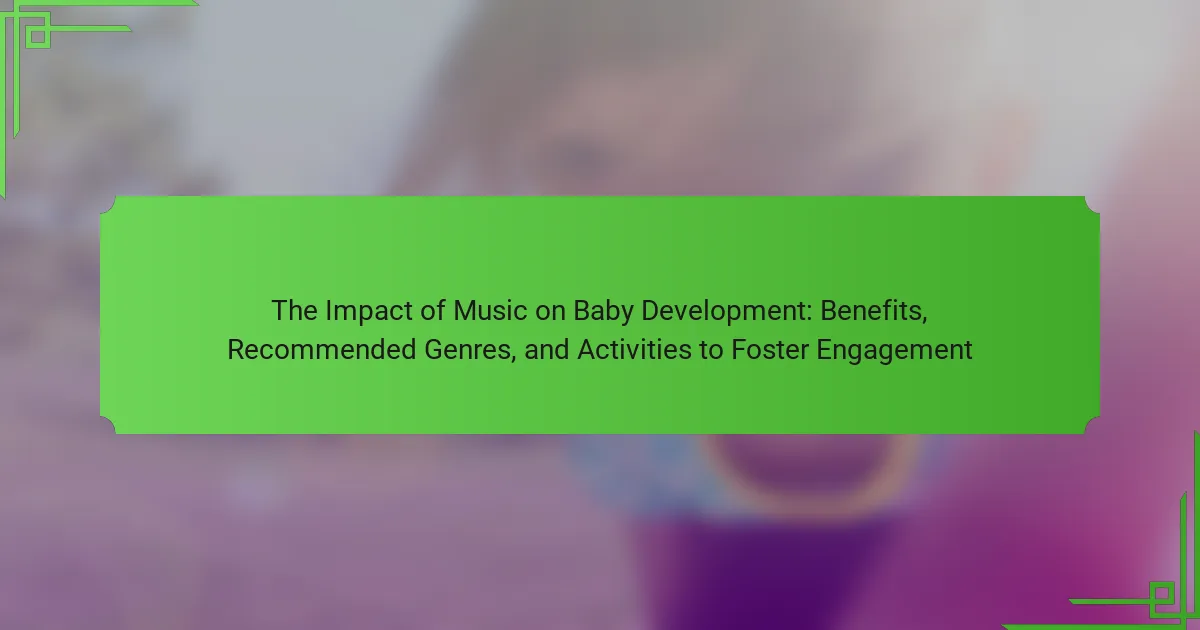Music significantly impacts baby development by enhancing cognitive skills, language acquisition, and emotional regulation. Research indicates that exposure to music stimulates brain areas linked to language and reasoning, with studies showing improvements in spatial-temporal skills among infants who listen to music. Recommended genres for babies include classical music, lullabies, and soft folk songs, which create a calming atmosphere conducive to growth. Engaging with music through simple instruments, singing, and interactive activities fosters motor skills, auditory development, and social interaction. Overall, music serves as a crucial tool for holistic development in infants.

What is the impact of music on baby development?
Music positively impacts baby development. It enhances cognitive skills, language acquisition, and emotional regulation. Research shows that exposure to music stimulates brain areas related to language and reasoning. A study by the University of California found that infants who listened to music demonstrated improved spatial-temporal skills. Music also fosters social interaction, helping babies bond with caregivers. Engaging with music can improve motor skills through movement and rhythm. Overall, music serves as a vital tool for holistic development in infants.
How does music influence cognitive development in babies?
Music influences cognitive development in babies by enhancing their auditory processing and memory skills. Exposure to music can stimulate brain areas involved in language and reasoning. Research shows that infants who listen to music exhibit improved spatial-temporal skills. A study published in “Developmental Science” found that musical training enhances cognitive abilities in young children. Furthermore, rhythmic patterns in music can promote neural connections in the brain. Engaging with music also encourages social interaction and emotional expression. These interactions can lead to better communication skills as babies grow. Overall, music serves as a valuable tool for cognitive development in early childhood.
What specific cognitive skills are enhanced by music exposure?
Music exposure enhances several specific cognitive skills, including memory, attention, and language development. Research indicates that music training can improve verbal memory and spatial reasoning. A study by Hanna-Pladdy and Mackay (2011) found that older adults with musical training performed better on cognitive tasks than those without. Additionally, music exposure promotes pattern recognition, which is fundamental for mathematical skills. Children exposed to music show improved literacy skills, as noted in studies by Anvari et al. (2002). These cognitive enhancements contribute to overall brain development and function.
How does music affect language acquisition in infants?
Music enhances language acquisition in infants by stimulating auditory processing and promoting phonetic discrimination. Infants exposed to music show improved ability to recognize speech sounds. This exposure aids in the development of vocabulary and grammar. Research indicates that musical activities can enhance memory and attention, both crucial for language learning. A study by Trainor and Desjardins (2002) found that infants can distinguish between different musical rhythms, which parallels their ability to discern speech patterns. Additionally, singing to infants fosters emotional bonding, which is linked to better language skills. Overall, music serves as a vital tool in the early stages of language development.
What are the emotional benefits of music for babies?
Music provides significant emotional benefits for babies. It promotes emotional bonding between infants and caregivers. Listening to music can soothe babies, reducing anxiety and stress. Engaging with music stimulates positive emotions, fostering happiness and joy. Research indicates that music exposure enhances mood regulation in infants. It also aids in developing social skills through shared musical experiences. Furthermore, music encourages self-expression, allowing babies to explore their emotions. Overall, music plays a crucial role in emotional development during early childhood.
How does music contribute to emotional regulation in infants?
Music contributes to emotional regulation in infants by influencing their mood and behavior. Research shows that infants respond positively to melodic sounds. These responses can lead to decreased stress and anxiety levels. Music can also help infants express their emotions more effectively. For example, soothing music may calm a fussy baby. Conversely, upbeat music can energize and stimulate them. Studies indicate that regular exposure to music enhances infants’ emotional development. The American Academy of Pediatrics supports music as a tool for emotional growth in early childhood.
What role does music play in bonding between parents and babies?
Music plays a significant role in bonding between parents and babies. It facilitates emotional connection and enhances communication. Singing and playing music creates shared experiences. This interaction promotes feelings of security for the baby. Research shows that music can stimulate brain development in infants. For example, a study published in the journal “Developmental Science” by Trainor and Schmidt highlights that musical interactions improve social bonding. Parents who engage in musical activities with their babies often report stronger attachment. Music also helps in developing a baby’s listening skills and emotional responses. Thus, music serves as a vital tool for fostering parent-baby relationships.
How does music affect physical development in babies?
Music positively influences physical development in babies. It enhances motor skills through rhythmic patterns. Babies often respond to music by moving their bodies. This movement can improve coordination and balance. Research indicates that exposure to music stimulates brain development. For example, a study by Schellenberg (2004) found that musical training enhances cognitive abilities. Engaging with music helps babies develop auditory skills as well. These auditory skills support language development, which is crucial for overall growth. Therefore, music plays a significant role in promoting physical and cognitive development in infants.
What types of movement are encouraged by music?
Music encourages various types of movement, including rhythmic swaying, clapping, and dancing. Rhythmic swaying involves gentle side-to-side motions that align with the music’s beat. Clapping promotes hand coordination and timing, enhancing motor skills. Dancing encourages full-body movement and expression, improving balance and coordination. Research shows that movement in response to music is vital for physical development. A study published in the Journal of Music Therapy highlights that music enhances gross motor skills in infants. Engaging with music through movement fosters cognitive and social development as well.
How does music promote sensory development in infants?
Music promotes sensory development in infants by stimulating auditory processing and enhancing cognitive skills. Infants respond to different sounds, rhythms, and melodies, which aids in their ability to distinguish between various auditory stimuli. This exposure helps develop their listening skills and attention span. Research shows that musical activities engage multiple senses, including hearing and touch, facilitating overall sensory integration. For instance, studies indicate that infants who are exposed to music exhibit improved memory and learning abilities. Engaging with music also encourages movement, which is crucial for physical development. Activities like clapping or dancing to music enhance motor skills and coordination.

What are the recommended genres of music for babies?
Classical music, lullabies, and soft folk songs are recommended genres of music for babies. Classical music can enhance cognitive development. Research indicates that exposure to classical music may improve spatial-temporal skills. Lullabies provide a soothing environment for infants. They can help with sleep patterns and emotional regulation. Soft folk songs often feature gentle melodies and repetitive structures. These qualities can promote language development and bonding. Overall, these genres create a calming atmosphere beneficial for babies’ growth.
Which genres are most beneficial for infant development?
Classical music and lullabies are most beneficial for infant development. Classical music promotes cognitive skills and emotional regulation. Research indicates that exposure to classical music can enhance brain development in infants. Lullabies help with language acquisition and emotional bonding. These genres provide soothing sounds that can reduce stress in babies. Studies show that music with a steady rhythm supports motor skill development. Engaging with these genres can foster early social interactions. Overall, classical music and lullabies create a nurturing environment for infant growth.
What characteristics make certain genres more suitable for babies?
Certain music genres are more suitable for babies due to their simplicity and calming effects. Genres like classical, lullabies, and soft folk music feature gentle melodies and slow tempos. These characteristics promote relaxation and can aid in sleep. Additionally, repetitive structures in these genres help babies recognize patterns. Familiarity with these patterns can enhance cognitive development. Research shows that exposure to soothing music can reduce stress in infants. The American Academy of Pediatrics recommends music as a tool for emotional bonding and developmental stimulation.
How do classical and lullaby music compare in their effects?
Classical music and lullaby music have different effects on babies. Classical music often promotes cognitive development and enhances concentration. Research indicates that exposure to classical music can improve spatial-temporal skills in infants. In contrast, lullaby music primarily aids in relaxation and sleep induction. Lullabies are designed with soothing melodies and rhythms, which help calm babies. Studies show that lullabies can lower heart rates and promote a sense of security. Both genres contribute positively to baby development, but their specific effects differ based on their intended purposes.
How can parents select appropriate music for their babies?
Parents can select appropriate music for their babies by choosing calming and soothing melodies. Research indicates that soft, gentle music can promote relaxation and better sleep for infants. Classical music, lullabies, and nature sounds are often recommended for their calming effects. Parents should also consider the tempo; slower tempos are generally more suitable for babies. Additionally, avoiding music with harsh sounds or abrupt changes is essential, as it can be startling. Engaging with music that features simple melodies and repetitive structures can aid in cognitive development. Studies show that exposure to music can enhance language skills and emotional intelligence in young children.
What factors should be considered when choosing music for infants?
When choosing music for infants, consider the tempo, volume, and lyrical content. Slow tempos are calming and suitable for relaxation. Loud volumes can startle infants and disrupt their comfort. Lyrical content should be simple and positive to promote a nurturing environment. Instrumental music can also be beneficial, as it avoids complex lyrics. Research shows that music with a steady rhythm can aid in cognitive development. Additionally, familiarity with certain melodies can create a sense of security for infants.
How can parents create a diverse music playlist for their babies?
Parents can create a diverse music playlist for their babies by selecting a variety of genres. Include classical, jazz, folk, and world music to expose babies to different sounds. Incorporate lullabies and nursery rhymes for familiarity and comfort. Choose songs with varied tempos and rhythms to stimulate auditory development. Use music from different cultures to enhance cultural awareness. Rotate songs regularly to keep the playlist fresh and engaging. Research shows that exposure to diverse music can promote cognitive skills and emotional development in infants. Studies indicate that varied musical experiences can enhance neural connections in the developing brain.

What activities can foster engagement with music in babies?
Playing simple instruments can foster engagement with music in babies. Instruments like maracas and tambourines encourage tactile exploration. Singing nursery rhymes stimulates auditory development. Dancing to music promotes physical coordination. Listening to various genres exposes babies to different rhythms. Interactive music apps can engage babies visually and audibly. Storytime with musical elements enhances cognitive skills. Group music classes provide social interaction and shared experiences. These activities are supported by research indicating that early musical exposure benefits cognitive and emotional development.
What interactive activities can parents do with babies to enhance musical engagement?
Parents can enhance musical engagement with babies through various interactive activities. Singing lullabies promotes bonding and auditory skills. Playing simple instruments, like shakers or tambourines, encourages rhythm exploration. Dancing together to music fosters physical coordination and enjoyment. Reading musical storybooks introduces sound and narrative. Engaging in clapping games helps develop timing and motor skills. Listening to diverse music genres exposes babies to different sounds. Attending live music events can create memorable experiences. These activities support cognitive and emotional development while nurturing a love for music.
How can singing and dancing together benefit babies?
Singing and dancing together can significantly benefit babies by enhancing their cognitive and emotional development. Engaging in these activities stimulates brain development through rhythm and melody. Babies exposed to music often show improved language skills. Singing promotes phonetic awareness, which aids in early literacy. Dancing encourages physical coordination and motor skills. It also fosters social bonding between caregivers and babies. Research indicates that music exposure can enhance memory and attention spans in infants. A study published in the journal “Developmental Science” found that musical interaction can strengthen neural connections in young children.
What role do musical instruments play in baby engagement?
Musical instruments play a significant role in baby engagement by stimulating sensory development and encouraging motor skills. Babies respond positively to sounds, which enhances their auditory perception. Instruments like rattles and xylophones promote hand-eye coordination as babies learn to grasp and manipulate them. Engaging with musical instruments fosters cognitive skills by introducing concepts like rhythm and cause-and-effect. Research indicates that exposure to music can enhance brain development in infants. A study published in the journal “Developmental Psychology” found that infants who interacted with musical instruments showed improved attention spans. Overall, musical instruments are effective tools for fostering engagement and developmental growth in babies.
How can structured music sessions benefit baby development?
Structured music sessions can significantly benefit baby development. These sessions enhance cognitive skills by stimulating brain activity. Engaging with music promotes language development as babies respond to rhythms and melodies. Social skills improve through group music activities, fostering interaction with peers. Emotional development is supported as music helps babies express feelings. Research indicates that early exposure to music can lead to better memory retention. A study published in the journal “Developmental Psychology” found that infants exposed to musical activities showed improved auditory skills. Overall, structured music sessions create a rich environment for holistic baby development.
What types of music classes are available for infants?
Music classes available for infants include parent-child classes, rhythm and movement classes, and music exploration classes. Parent-child classes often involve singing, dancing, and playing instruments together. Rhythm and movement classes focus on developing coordination through music and movement activities. Music exploration classes introduce infants to various sounds and instruments to stimulate auditory development. According to research by the National Association for Music Education, early exposure to music enhances cognitive development and social skills in infants.
How can parents incorporate music into daily routines?
Parents can incorporate music into daily routines by playing songs during activities. For example, they can play calming lullabies during nap time. This practice helps create a soothing environment for babies. Additionally, parents can sing songs during bath time to make it enjoyable. Engaging in musical games during playtime can stimulate cognitive development. Dancing to music together encourages physical activity and bonding. Using music while cooking can introduce rhythm and sounds in a familiar context. Research shows that music exposure enhances language skills in infants. Daily integration of music fosters a positive atmosphere and supports emotional growth.
What are some best practices for using music to support baby development?
Playing music regularly can significantly support baby development. Engaging with music enhances cognitive skills, language acquisition, and emotional bonding. Choose a variety of genres to expose babies to different rhythms and melodies. Classical music, for example, is known to promote brain development. Singing to your baby fosters language skills and emotional connection. Incorporate music during playtime to encourage movement and coordination. Use instruments like rattles or drums to develop motor skills. Create a calming environment with soft music during nap times to aid relaxation. Regularly interacting with music can improve a baby’s overall developmental milestones.
The main entity of the article is the impact of music on baby development. The article explores how music enhances cognitive skills, language acquisition, emotional regulation, and physical development in infants. It discusses specific cognitive skills improved by music exposure, the emotional benefits for babies, and the role of music in fostering parent-baby bonding. Additionally, it provides recommendations for suitable music genres, activities to engage babies with music, and best practices for parents to incorporate music into daily routines to support overall development.
